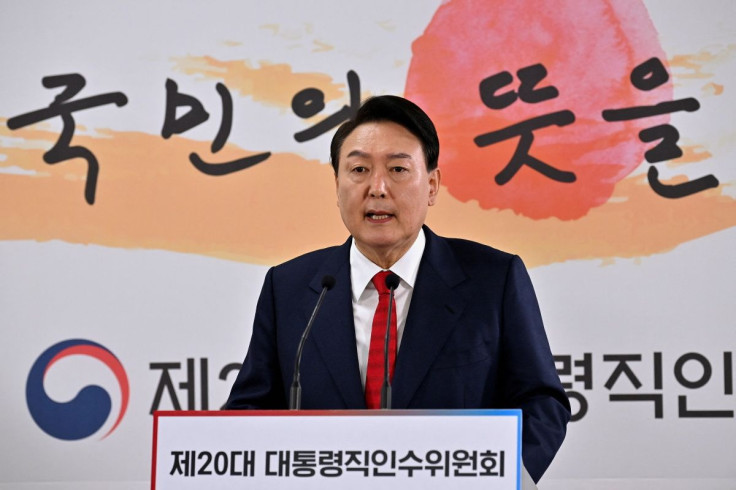South Korea’s Olive Branch To Japan Ahead Of Biden’s Asia Visit

Weeks before U.S. President Joe Biden's proposed visit to both countries, President-elect Yoon Suk Yeol of South Korea has offered an olive branch to Tokyo with the Ukraine crisis serving as a reminder to both countries of their reliance on their mutual ally and a recalcitrant North Korea leader firming up the communist nation's alleged nuclear plans.
Between the two countries, they host the bulk of U.S. troops in the region. Warming ties between Japan and South Korea, the two U.S. allies, would be hailed by the Biden administration as it seeks cooperation to counter security threats posed by China and North Korea. On the trade front, the U.S. wants to secure supply chains for key goods like semiconductors free from interference from Beijing.
Yoon, a conservative, has hinted at a hawkish diplomatic course, which is in tandem with some security priorities of the conservative government of Japanese Prime Minister Fumio Kishida.
Their ties mainly on security cooperation and trade plunged to their worst state in decades under outgoing liberal President Moon Jae-in over whether Japan had sufficiently paid for the 1910-1945 colonization of the Korean Peninsula.
The Moon administration considered Japan as an obstacle to achieving peace on the Korean Peninsula and Japan regarded the Moon government as pro-North Korea. Following U.S. President Biden's inauguration in 2021, there were efforts to improve relations with Japan. However, not much came of this approach as there was no clear consensus on the sexual slavery issue and compensation for forced labor.
Both South Korean and Japanese governments are in delicate political situations. President-elect Yoon faces challenges in cobbling together his new administration. Japan Prime Minister Kishida faces an election to the upper house of parliament in July 2022. The Biden administration is too busy with the strategic crisis in East Europe and its global implications.
Giving priority to security over history, Yoon is of the view that the U.S. is needed for South Korea's overall security, and therefore there is the need to mend ties with another U.S. ally in the region -- Japan.
Kishida, who earlier played a lead role in solving the comfort women issue, who suffered under Japan's military brothel system before and during World War II, has expressed hope that the two countries can build healthy ties under Yoon. Kishida was one of the first global leaders to congratulate Yoon on his election victory.
A South Korean delegation of lawmakers and policy experts sent by President-elect Yoon Suk-yeol reached Japan April 24 for a five-day tour aiming to make progress in defrosting bilateral ties. Yoon is seeking a trilateral response with its key ally to North Korea's saber-rattling and its nuclear ambitions.
The delegation met with Japan's top diplomat April 25 and the two sides agreed to strengthen cooperation. The delegation's visit to Japan took place weeks before Biden is expected to visit both South Korea and Japan, scouting for regional allies for its Indo-Pacific strategy aimed at containing China and North Korea which is set to conduct its first nuclear test in nearly five years.
The seven-member delegation, headed by Chung Jin-suk of Yoon's conservative People Power Party, may meet with Japanese Prime Minister Kishida to hand him a letter from Yoon which contains South Korean leader's plan for improving ties.
I think the letter carries Yoon Suk-yeol's "will and expectations for new relations with Japan," Chung was quoted as saying after arriving at Narita International Airport.
The team will discuss the possibility of Kishida attending Yoon's May 10 inauguration ceremony.
Yoon has called for a future-oriented approach to improve bilateral ties that have soured largely over wartime history issues.
The president-elect has stressed the need to activate the cooperative partnership of 1998 between South Korean President Kim Dae-jung and then-Prime Minister Keizo Obuchi who had apologized for "tremendous damage and suffering" that Japan caused on Koreans during its 1910-1945 rule of the Korean Peninsula.
Tokyo wants Seoul to honor the 1965 treaty that effectively put an end to calls for compensation in wartime labor lawsuits settling the comfort women controversy.
But the pressure on the courts to halt the cases could threaten the South Korean judiciary's independence, creating a fresh scandal for the new leader who is facing an opposition firmly in control of the National Assembly.
President-elect Yoon is less likely to weaponize South Korea-Japan ties which often resulted in prolonged periods of bilateral antagonism. Mainly concerned with politics, history, security, and approaches toward North Korea, South Korea, and Japan have maintained their abnormal relations for 11 years without a single summit.
The delegation is also the second set up by Yoon after another team paid a visit to the United States earlier this month.
Senior Japanese Foreign Ministry officials have praised Yoon and termed the plan to send the delegation as "a step forward."
"We can't leave the issues as they are," Chief Cabinet Secretary Hirokazu Matsuno told an April 18 news conference.
The potential for a thaw in ties between South Korea and Japan under the new administration of Yoon augers well for the U.S. which is keen on fostering trilateral coordination between two major Indo-Pacific partners.
Yoon is expected to send a delegation to China before his inauguration next month.





